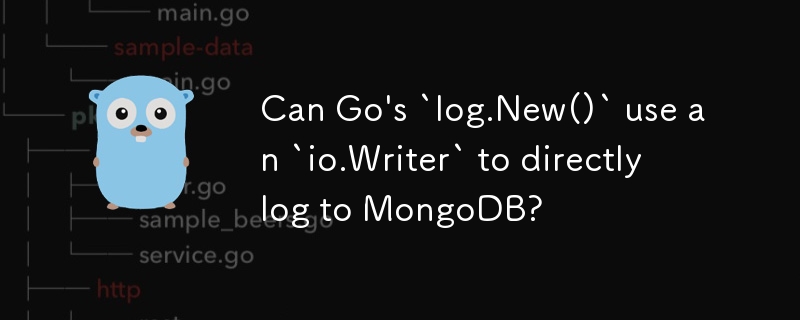

Go: Utilizing io.Writer Interface for MongoDB Logging
The question arises whether it is possible to establish a logger that outputs directly to a database, specifically within the context of MongoDB. More precisely, can an io.Writer interface be implemented and supplied as the initial parameter to log.New()? This interface would effectively enable direct logging to the MongoDB database.
The conventional approach would be to create a custom database logging function. However, it is worth exploring if there are existing options within the Go language that provide this functionality.
Within the context of MongoDB, mgo.v2 is the primary library utilized for database handling. However, it lacks io.Writer interfaces aside from GridFS, which serves a distinct purpose.
Despite this, implementing io.Writer for MongoDB logging is feasible. This is predicated on the guarantee by the log.Logger type that each log message is delivered to the designated io.Writer with a single Writer.Write() invocation.
Implementing a type that adheres to io.Writer, wherein its Write() method creates a document containing the payload of the byte slice and persists it in MongoDB, suffices.
type MongoWriter struct {
sess *mgo.Session
}
func (mw *MongoWriter) Write(p []byte) (n int, err error) {
c := mw.sess.DB("").C("log")
err = c.Insert(bson.M{
"created": time.Now(),
"msg": string(p),
})
if err != nil {
return
}
return len(p), nil
}By harnessing this implementation:
sess := ... // Obtain a MongoDB session
mw := &MongoWriter{sess}
log.SetOutput(mw)
// The default Logger of the log package now utilizes our MongoWriter.
// Generate a log message for insertion into MongoDB:
log.Println("I'm the inaugural log message.")
log.Println("I'm multi-line,\nbut remain within a single log message.")It is important to note that log messages generally conclude with a newline, which is appended by log.Logger even in its absence from the actual message. Should you prefer to omit this terminating newline, simply trim it:
func (mw *MongoWriter) Write(p []byte) (n int, err error) {
origLen := len(p)
if len(p) > 0 && p[len(p)-1] == '\n' {
p = p[:len(p)-1] // Cut terminating newline
}
c := mw.sess.DB("").C("log")
// ... the rest remains unchanged
return origLen, nil // Original length must be returned (due to p being resliced)
}The above is the detailed content of Can Go\'s `log.New()` use an `io.Writer` to directly log to MongoDB?. For more information, please follow other related articles on the PHP Chinese website!




